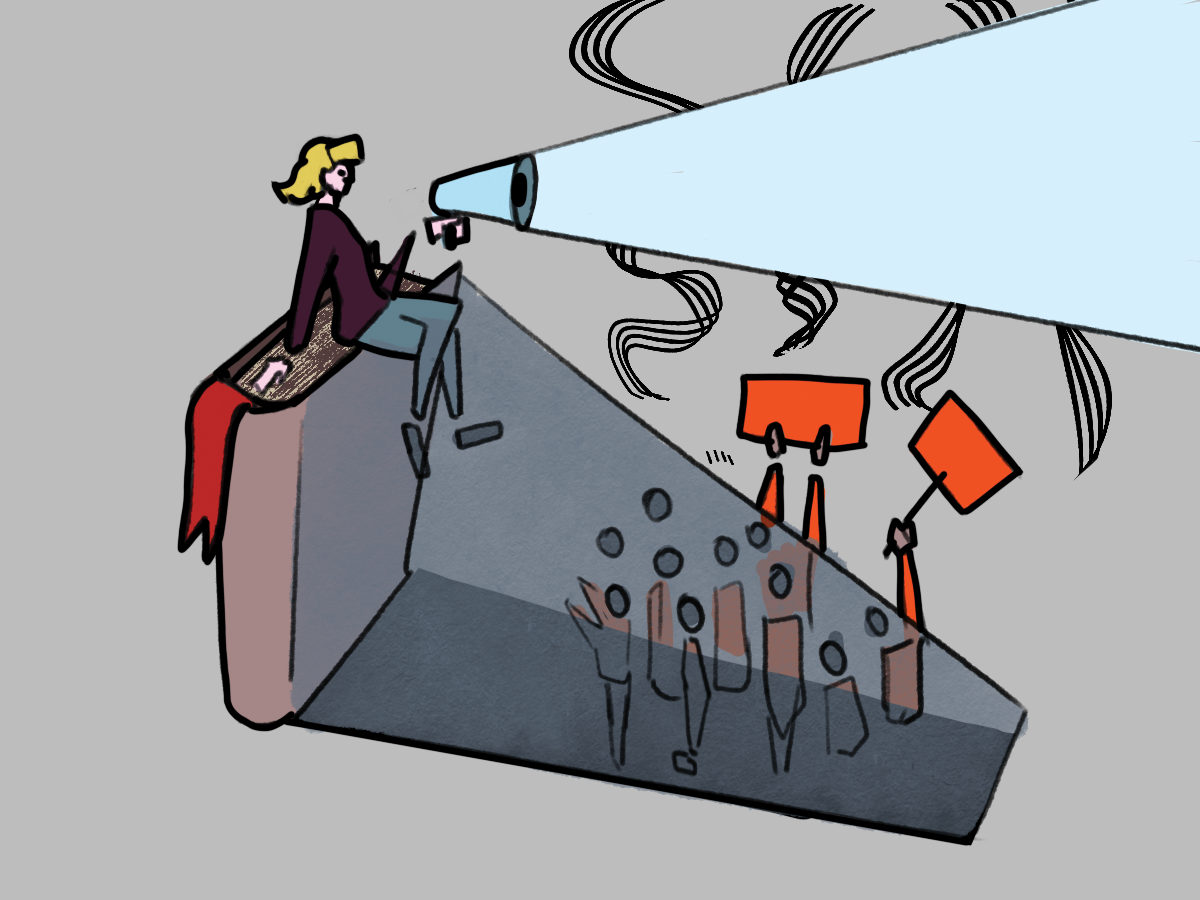Many students in a First Peoples Studies class walked out due to a speaker’s claims on residential schools.
Multiple Concordia students walked out of a class on Algonquian Peoples on Oct. 28 due to the comments of a guest lecturer, Toby Morantz, a retired McGill professor. Morantz told the class that the James Bay Cree suffered less in residential schools than other Indigenous people.
Morantz was invited to speak in class by the professor, Emanuel Lowi, on her book The White Man’s Gonna Getcha: The Colonial Challenge to the Crees in Quebec, which was assigned reading for the course.
“She basically tried to argue that the James Bay Cree suffered significantly less than other [Indigenous] nations,” said Mavis Poucachiche, who is from the Waswanipi community that is part of the James Bay Cree Nation. Poucachiche explained that Morantz was specifically talking about residential schools in Fort George, and how the children did not have to travel far from their homes to attend. It was common practice for Indigenous children to be sent to residential schools far from their community, and not allowed to return home for the summer or holidays.
Poucachiche said that another student in the class, who is also James Bay Cree, told Morantz that their grandparents, who were from Fort George, were forcibly taken away to a residential school. Morantz then apparently wagged her finger at this student, saying “No, no no, no.”
“A few students felt uncomfortable with what I had said and walked out of the classroom. That is their prerogative,” said Morantz, who explained that she miscommunicated the differences in the policies enacted in James Bay and elsewhere after WWII, and tried to correct what she said once she saw the students misunderstood her.
She also stated that she is upset by how people and the media have labeled her as racist, and that she has received many emails in support, saying that she is being misrepresented in the media.
Morantz is credited along with other historians in an open letter from August by the Dorchester Review, which disagrees with the Canadian Historical Association’s statement that the Canadian government’s treatment of Indigenous people was an act of genocide.
Shortly after Morantz wagged her finger at the student, multiple people, including Poucachiche, walked out of class.
“It was just so disrespectful,” said Poucachiche, who said that Morantz’s studies were from a colonial perspective; that in her book she only references the Hudson’s Bay Company and other non-Indigenous sources. “She just kept telling that we were wrong, like us Cree people were wrong.”
“It made us really uncomfortable and it was traumatizing for us to have to hear this,” said Catherine*, who is white-mixed and Mi’kmaq.
Catherine explained that Professor Lowi did nothing to stop Morantz for the entire class, besides stating during the class that some of Morantz’s comments were inappropriate.
Even as students walked out after Morantz said the children at the Fort George residential schools suffered less physical and sexual abuse compared to other schools, or when Morantz called Indigenous people Indians and referred to them as homeless and drunks, Lowi did nothing to intervene and stop the presentation.
“[Morantz] said that if you are a lawyer or a teacher, bush life doesn’t impact your everyday life,” said Catherine. Bush life refers to the social, cultural, and physical skills that Indigenous people practice in nature. “This was incredibly insulting, traditional life literally shapes our entire being, it’s not some distant thing.”
The class now has a new syllabus and is being taught by Manon Tremblay, the senior director of indigenous directions, and who is a nêhiyaw-iskwêw (Plains Cree) from the Muskeg Lake Cree Nation. On Nov. 4, Tremblay, alongside Dr. Catherine Kinewesquao Richardson, the director of First Peoples Studies at Concordia, and who is Métis with Cree, Dene, and Gwich’in ancestry, held a space for students to share their experiences and thoughts on the issue.
“It really reminded me of being back home with my family and where we would sit around the table and just laugh,” said Poucachiche, describing what having Tremblay as the new professor is like. “It was a heartwarming experience and I’m really grateful that Catherine [Richardson] and Manon are listening to us and taking this seriously.”
“I think her [Morantz] conduct in class is terrible and really disheartening,” said Richardson, who explained that she and her colleagues always work hard to implement cultural safety, and uplift Indigenous students who have already faced many obstacles to be in the classroom.
Richardson stated that for legal reasons she cannot say if there have been repercussions for Lowi, but he is currently not teaching any classes at the moment. She also explained that he was remorseful about what occurred, and there have been letters sent supporting Lowi, but it is also clear that inviting Morantz was a mistake and her lecture caused harm.
On Oct. 29, Lowi sent a Moodle message to the class, stating that Morantz’s remarks were outrageous, and that he had never met her before that class.
“Those students who walked out were totally right to do that. If I had been a student in the classroom, I would have walked out too,” said Lowi in the message.
Lowi has not responded to any requests for an interview.
*Catherine requested anonymity of her last name.
Graphic by James Fay
